Spotlight
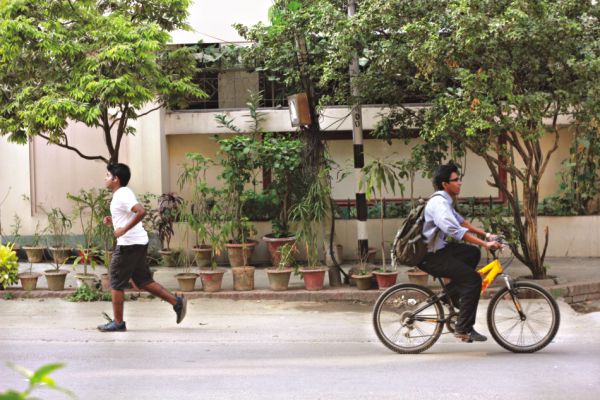
Finding the Balance Within
Saad Adnan Khan
Photos:Kazi Tahsin Agaz Apurbo
The summer heat is on! So is the pressure of final assignments, part-time jobs and extra-curricular and community activities and projects. While ludicrous statements (made by our dear politicians) that expound on the necessity of load-shedding, leave behind some unpleasant whiff lingering in the air, heat waves spread like uncomfortable, damp tentacles, slowly squeezing the living souls out of us. When you have more than one reason to drive you crazy, it is important that you take some extra necessary steps to stay sane- one of them is eating healthy and encouraging friends and family to do the same!
Students are busy- there is no doubt about that. They have classes from morning till evening, and then they run off to jobs, or addas or jamming sessions. Whatever it is, students are on their toes 24/7.
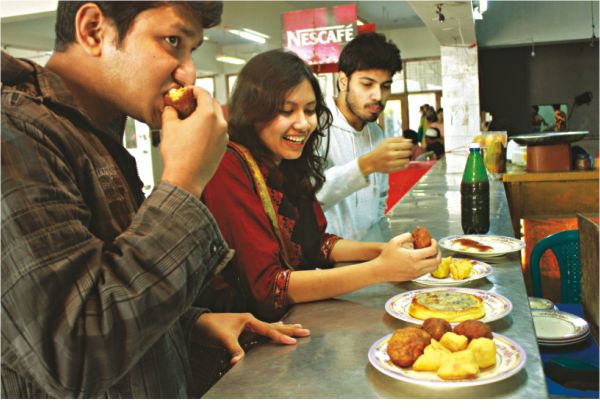
Having a healthy eating habit on campus is a must to stay and feel healthy.
They are constantly moving and thinking (go through their statuses and tweets to get a good idea). Students are becoming independent day by day as they pay their own tuition fees, ride their own bicycles and get involved in activities that they love. For which, it will be ridiculous to assume that students will pay much heed to their diet when there are bigger matters that need to be taken care of, like saving the planet, or perhaps providing homes to stray dogs. When students are already scrambling for time to complete their assignments for teachers and take last minute preparations to present in front of their bosses, students end up eating just for the sake of eating. It no longer matters to them what they eat, as long as it is any food and fills up the stomach. On days, students have three (even four) back to back classes. So what ends up happening is that they tip-toe down fifteen floors (during the class period), run to the cha stall, ask the mama to pack some petite shingaras, puris and piajoos in a packet, run back to class (after waiting on the elevator queue for an infuriating amount of time), sit at the back of the classroom and sneakily munch on the oily snacks carrying very low nutrition value as the teacher rambles on with lectures.

Students should cut down on their intake of oily food on campus.
 |
|
Cucumber- a great food to deal with the summer heat. |
|
This is a common scenario in the lives of most of our students nowadays, who could not care less about what they eat, because quite frankly students do not have the privilege to think about food. However “cool” and “radical” the notion may seem, such an attitude can cost one's good health. Jeopardising one's health and pretending to appear 'too-busy-to-care', does not do anyone any good. Young people should be more aware of their health, because they need the energy and need to have good health in order to accomplish all the activities that they need and want to do.
It is not like students do not know the consequences of having too much of junk food. Everyone is aware of cholesterol and what it does to the body. A difference is made when people are aware and they start acting upon it. Students are aware of the fact that having tehari (a popular meal among students) everyday, especially in this summer can affect their healths disastrously. Having fast food such as french fries, burger, pizza and fried rice should also be avoided. Having such cholesterol rich food will only make one fatigued, which is the last thing a student wants to feel on a hot, busy day. As mentioned earlier, there are plenty of factors (add traffic congestion to the list) that are out of our control and that exhaust students. But our health is in our control, and with a little bit of attention and also awareness among friends, students can follow a healthy diet without much ado.
Instead of having tehari, students can opt for khichuri, which is a healthier option. Instead of having deep fried food, students can have boiled and/or cooked food. Boiled eggs sold as road side snacks can be a fun, quick and healthy snack. Instead of having french fries, one can have chotpoti, which is made of chick-pea. Students can also go for sliced tomatoes, carrots and cucumbers, which will keep one hydrated. Of course students need foods that are filling and salads might not always be filling. But it is important to find a balance and plan a little. A perfectly healthy and beautiful meal can be khichuri and sliced vegetables.
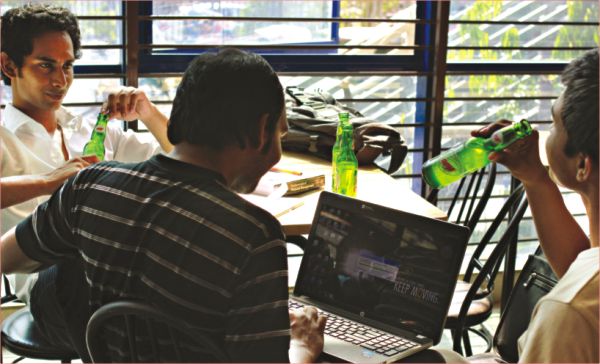
Instead of fizzy drinks, students can opt for water and fresh juices.
“We do not always have healthy options. You have to choose and pick between the best options available. Students can also take tiffin from home. If you are the healthiest within your circle of friends, taking tiffin will not seem uncool anymore,” says Karim Waheed, fitness columnist.
| |
 |
| |
Taking the stairs can be a light exercise. |
Taking tiffin might seem like a gargantuan (and also pointless) task to accomplish to students, but the effects are many and beneficial in the long run. Instead of eating out every day, students can take a little time to prepare their tiffin the night before, or early in the morning. It does not have to be anything special. It can be bread with peanut butter (peanut butter is always filling). Students can also bring dim bhaji and ruti made of whole wheat flour (brown flour). The egg fry in this case will be made by you, for which you will know how to use oil in moderate amount. Once again you can have some street side vegetable, along with whatever you decide to bring for your tiffin. So be creative when it comes to preparing meals for yourself- it is fun and it will have long lasting effects, such as sustaining sound health of young individuals for the benefit of the nation.
Fizzy drinks should be taken moderately too (or not at all). In this summer, what one needs to have is plenty of water. Always carry a water bottle and refill it all through-out the day. When students forget to carry water with them, they end up buying fizzy drinks. Instead, students can have seasonal juices, which are way healthier than fizzy drinks. Cups after cups of tea, with condensed milk and spoonful sugar should be cut down on too. Students can ask the cha-walas to put in less sugar, or go for rong cha instead.
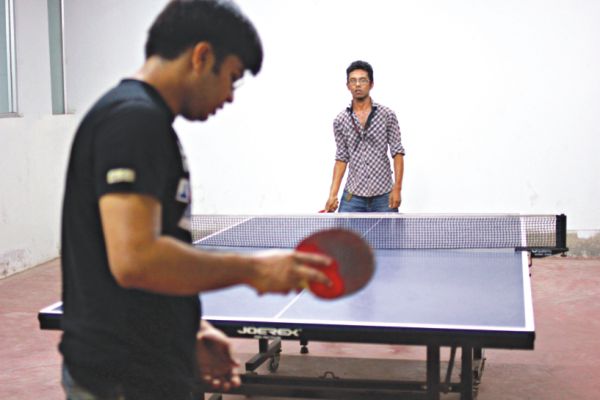
Students should get involved with different activities to stay active and fit.
To stay healthy students can also be physically active. This does not mean that they should start thinking about joining the gym, but a light work-out routine might be good for everyone. If your university is close by your home you can walk (that is if the heat is bearable). Take the stairs if you have class on the third floor and not stand in the queue of the lift for ages. Riding a bicycle to university is what many students are doing nowadays. This can be a fun activity if you do it with friends (of course make sure that you are good at it to avoid accidents). Most universities do not have sports facilities, but you can play your favourite sport on the weekend, or you can run and do some push-ups, skipping and crunches for 20-30 minutes at night on alternative days. It is all up to how you manage a little time to stay healthy and fit, but make sure that you do.
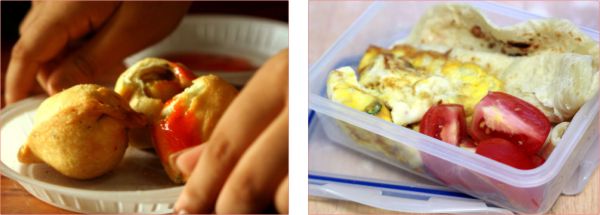
Students should get involved with different activities to stay active and fit.
Students can also form health committees to monitor the food quality sold at canteens and the makeshift tea stalls. They can advise the mamas on how to use oil and in what amount, because let's face it, we do not want to deprive the mamas of the income they earn from selling the food they make. But we can help them to become more aware of health and hygiene, and bring them on board to create a healthy eating environment on campus.
| 